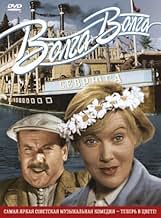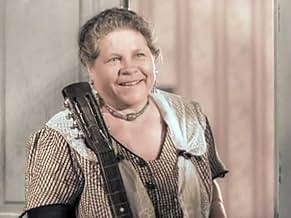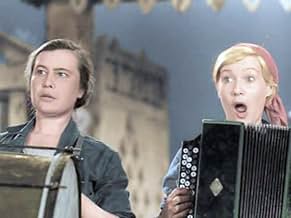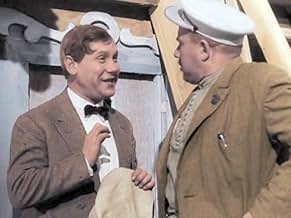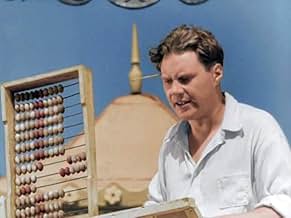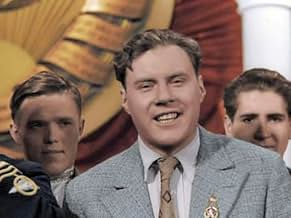VALUTAZIONE IMDb
6,6/10
808
LA TUA VALUTAZIONE
Aggiungi una trama nella tua linguaWidely claimed to be Joseph Stalin's favorite movie, this classic musical comedy is a must-see. The action takes place on a steamboat on the iconic Volga River, as two groups of performers t... Leggi tuttoWidely claimed to be Joseph Stalin's favorite movie, this classic musical comedy is a must-see. The action takes place on a steamboat on the iconic Volga River, as two groups of performers travel to Moscow to perform in the Moscow Musical Olympiad.Widely claimed to be Joseph Stalin's favorite movie, this classic musical comedy is a must-see. The action takes place on a steamboat on the iconic Volga River, as two groups of performers travel to Moscow to perform in the Moscow Musical Olympiad.
- Premi
- 1 vittoria in totale
Anatoli Shalayev
- The Boy Musical Prodigy
- (as Tolya Shalayev)
Mariya Mironova
- The Secretary
- (as M. V. Mironova)
Nikita Kondratyev
- The Waiter
- (as N. S. Kondratyev)
Vsevolod Sanaev
- The Lumberjack
- (as V. V. Sanayev)
Alexei Dolinin
- The Militia Man
- (as A. G. Dolinin)
Ivan Chuvelyov
- The Olympiad Representative
- (as I. P. Chuvelyov)
Nikolai Khryashchikov
- Appearing
- (non citato nei titoli originali)
Yakov Rykov
- Tugboat captain
- (non citato nei titoli originali)
Lidiya Vinogradova
- Amateur Performer
- (non citato nei titoli originali)
Trama
Lo sapevi?
- QuizFamously, this was Joseph Stalin's favorite film and he would often show off how well he knew it by performing every part just before the actors on screen.
- ConnessioniFeatured in Komediya davno minuvshikh dney (1980)
Recensione in evidenza
As most of its (all too few) viewers know, »Volga Volga« was supposed to be the Soviet counterpart to Hollywood musical comedies of the time. It is also well-known it was Stalin's favourite movie... So what? Wagner was Hitler's favourite composer does that make him a bad composer? Hitler also loved Greta Garbo, Charlie Chaplin, Marlene Dietrich... does that make them trash?
However, I *do* find it fascinating that Stalin loved this film. I find it even more fascinating that the film was released for the general public to see, and that its director wasn't sent to Siberia.
Yes, it has propaganda written all over it in the same fashion as the contemporary »Yankee Doodle Dandy« has, to mention just one famous non-Soviet example. But what makes this film such a wonderful comedy is the intelligent at times spine-chilling humour of the dialogues. However, only viewers who are familiar with the Soviet political (and general) culture of the time will appreciate them or even notice them. If one doesn't know that the young man is reciting a very famous poem by Lermontov when trying to impress the semi-illiterate political chieftain, it will be very difficult to appreciate the latter's bewildered expression and his reply: »Oh, begone with your self-critique, save it for the next political meeting« (I am quoting from memory, based on the original, not on the English translation, which I am not familiar with). Indeed, one has to know what »self-critique« meant... If you do, you'll find it a cracking-funny dialogue. The same goes for many, many other scenes like the one when the ship's cook introduces (and re-introduces) himself to the ignorant political chief, starting merrily as a »chef« and ending up as a »food-processing worker«. And then some scenes are sheer poetry: like the one when the entire village is chanting the contents of a telegram from the river bank, so that the eager recipient of the telegram already embarked on a ship - will hear it..:)
The ideology behind it is clear: only the peasants sorry, »land workers« - are healthy and wise. The only jerk in the film is the hilariously ignorant and self-important representative of the political »authorities«. This, I suppose (besides the wonderful humour and the cheerful music), is what made this film so popular with the »masses«. And this must be also the reason why the film was released. (In 1938, no less when political »purging« was at its worst.)
There are however, certain scenes in the film that make me wonder how on earth it made it past the censors. (Due to Stalin's personal intervention, no doubt?) The oddest example comes towards the end of the film, when the political chieftain is asked by the port authorities whether he is the author of the (title) song »Volga Volga«. Panicking, he not only blames someone else (»Shulbert«, Franz Schubert to you and me) regardless of the fact that »Shulbert« most definitely did NOT »do« it - but he starts screaming: »I confess nothing, I confess nothing!«, even though nobody had asked him to confess anything... Only those who know what »confession« implied can find his mindless reaction hilarious and spine-chilling.
It is said that Stalin had a copy of this film delivered to the USA authorities. They were so baffled by it that they searched it for hidden messages. If this is true, it just goes to show how little they understood and knew about each other.
Or is there a hidden message...? :)
However, I *do* find it fascinating that Stalin loved this film. I find it even more fascinating that the film was released for the general public to see, and that its director wasn't sent to Siberia.
Yes, it has propaganda written all over it in the same fashion as the contemporary »Yankee Doodle Dandy« has, to mention just one famous non-Soviet example. But what makes this film such a wonderful comedy is the intelligent at times spine-chilling humour of the dialogues. However, only viewers who are familiar with the Soviet political (and general) culture of the time will appreciate them or even notice them. If one doesn't know that the young man is reciting a very famous poem by Lermontov when trying to impress the semi-illiterate political chieftain, it will be very difficult to appreciate the latter's bewildered expression and his reply: »Oh, begone with your self-critique, save it for the next political meeting« (I am quoting from memory, based on the original, not on the English translation, which I am not familiar with). Indeed, one has to know what »self-critique« meant... If you do, you'll find it a cracking-funny dialogue. The same goes for many, many other scenes like the one when the ship's cook introduces (and re-introduces) himself to the ignorant political chief, starting merrily as a »chef« and ending up as a »food-processing worker«. And then some scenes are sheer poetry: like the one when the entire village is chanting the contents of a telegram from the river bank, so that the eager recipient of the telegram already embarked on a ship - will hear it..:)
The ideology behind it is clear: only the peasants sorry, »land workers« - are healthy and wise. The only jerk in the film is the hilariously ignorant and self-important representative of the political »authorities«. This, I suppose (besides the wonderful humour and the cheerful music), is what made this film so popular with the »masses«. And this must be also the reason why the film was released. (In 1938, no less when political »purging« was at its worst.)
There are however, certain scenes in the film that make me wonder how on earth it made it past the censors. (Due to Stalin's personal intervention, no doubt?) The oddest example comes towards the end of the film, when the political chieftain is asked by the port authorities whether he is the author of the (title) song »Volga Volga«. Panicking, he not only blames someone else (»Shulbert«, Franz Schubert to you and me) regardless of the fact that »Shulbert« most definitely did NOT »do« it - but he starts screaming: »I confess nothing, I confess nothing!«, even though nobody had asked him to confess anything... Only those who know what »confession« implied can find his mindless reaction hilarious and spine-chilling.
It is said that Stalin had a copy of this film delivered to the USA authorities. They were so baffled by it that they searched it for hidden messages. If this is true, it just goes to show how little they understood and knew about each other.
Or is there a hidden message...? :)
I più visti
Accedi per valutare e creare un elenco di titoli salvati per ottenere consigli personalizzati
Dettagli
- Tempo di esecuzione1 ora 44 minuti
- Colore
- Mix di suoni
- Proporzioni
- 1.37 : 1
Contribuisci a questa pagina
Suggerisci una modifica o aggiungi i contenuti mancanti


